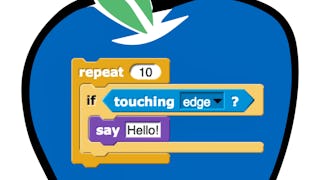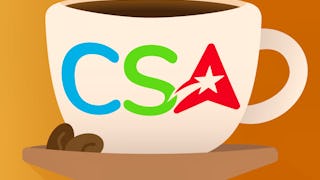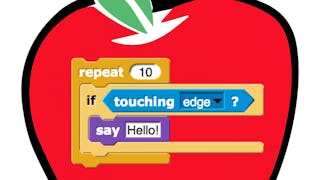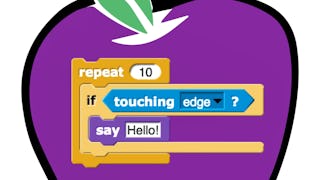Want to make a game that ends when you "catch" an object by clicking on it? Or maybe you get points based on how close you came? You'll do that in this class!

Enjoy unlimited growth with a year of Coursera Plus for $199 (regularly $399). Save now.

Computational Thinking for K-12 Educators: Conditional Loops and If Statements
This course is part of Computational Thinking & Block Programming in K-12 Education Specialization

Instructor: Beth Simon
Included with
Skills you'll gain
Details to know

Add to your LinkedIn profile
8 assignments
See how employees at top companies are mastering in-demand skills

Build your subject-matter expertise
- Learn new concepts from industry experts
- Gain a foundational understanding of a subject or tool
- Develop job-relevant skills with hands-on projects
- Earn a shareable career certificate

There are 6 modules in this course
Meet Dr. Simon and fellow learners in this class! Find out what you’ll be doing and learning.
What's included
2 videos2 readings1 discussion prompt
In this module we will learn about conditional loops and how they vary from fixed loops. We'll examine different examples of both loop types and look at some common challenges that you may come across. Finally you'll create your own conditional loop program and have the opportunity to create an assignment and conduct peer reviews.
What's included
8 videos3 readings2 assignments1 discussion prompt
Now that you've gotten an introduction to conditional loops, we will further explore them and their variations. We will look at why some programs require conditional loops and discuss suggestions that will help students trace each program. Finally we'll learn about a variation on the repeat until loop, called the do-while loop.
What's included
1 video2 readings1 assignment1 app item1 discussion prompt
In this module we'll get an introduction to conditionals, which are also known as if-else statements. First we'll examine some examples of if-else conditionals that exist in our everyday life. Next you will take a look at videos of completed programs and recreate the code. We'll end with some debugging tips and have you create your own if-else program assignment.
What's included
2 videos3 readings3 assignments
Now that you have a basic understanding of conditionals, we look at some more complicated cases. You'll watch a video of how a teacher introduces the topic to her class and learn about conditionals with more than 2 scenarios. You'll also look at programs with two independent conditionals and learn how this varies from else-if statements. Finally, you'll analyze some misconceptions and challenges you initially had when learning about conditionals and create resources to help others learn about conditionals.
What's included
1 video2 readings1 assignment1 app item2 discussion prompts
In this module we take a look at peer instruction, an interactive teaching method that promotes learning. You will learn how peer instruction works and its benefits through various evidence-based studies. Then you'll determine how it can be applied to a computer science course and examine additional reasons peer instruction is beneficial in teaching computer science in class. You will have the opportunity to apply what you learn when creating a resource and peer reviewing others' work.
What's included
4 videos1 reading1 assignment1 app item1 discussion prompt
Earn a career certificate
Add this credential to your LinkedIn profile, resume, or CV. Share it on social media and in your performance review.
Instructor

Offered by
Explore more from Education
 Status: Free Trial
Status: Free TrialUniversity of California San Diego
 Status: Free Trial
Status: Free TrialUniversity of California San Diego
 Status: Free Trial
Status: Free TrialUniversity of California San Diego
 Status: Free Trial
Status: Free TrialUniversity of California San Diego
Why people choose Coursera for their career





Open new doors with Coursera Plus
Unlimited access to 10,000+ world-class courses, hands-on projects, and job-ready certificate programs - all included in your subscription
Advance your career with an online degree
Earn a degree from world-class universities - 100% online
Join over 3,400 global companies that choose Coursera for Business
Upskill your employees to excel in the digital economy
Frequently asked questions
To access the course materials, assignments and to earn a Certificate, you will need to purchase the Certificate experience when you enroll in a course. You can try a Free Trial instead, or apply for Financial Aid. The course may offer 'Full Course, No Certificate' instead. This option lets you see all course materials, submit required assessments, and get a final grade. This also means that you will not be able to purchase a Certificate experience.
When you enroll in the course, you get access to all of the courses in the Specialization, and you earn a certificate when you complete the work. Your electronic Certificate will be added to your Accomplishments page - from there, you can print your Certificate or add it to your LinkedIn profile.
Yes. In select learning programs, you can apply for financial aid or a scholarship if you can’t afford the enrollment fee. If fin aid or scholarship is available for your learning program selection, you’ll find a link to apply on the description page.
More questions
Financial aid available,

